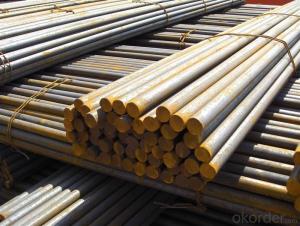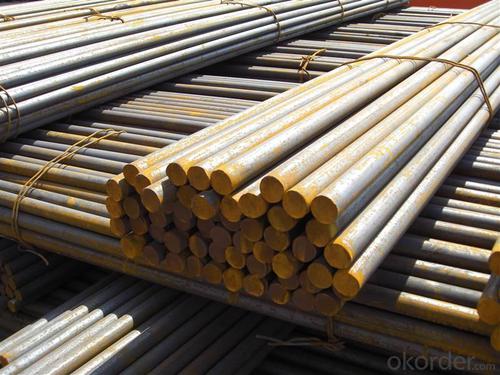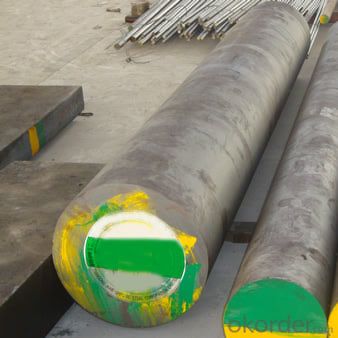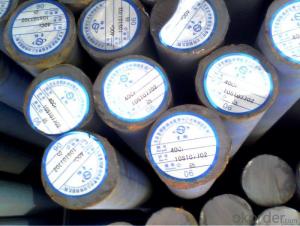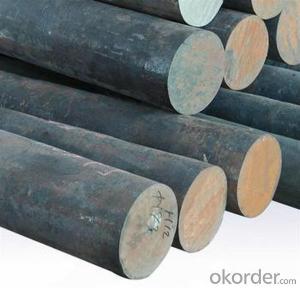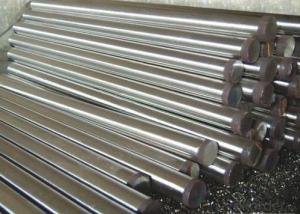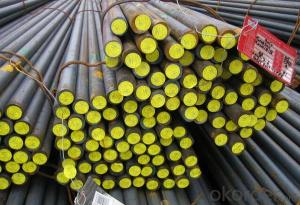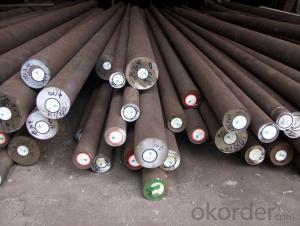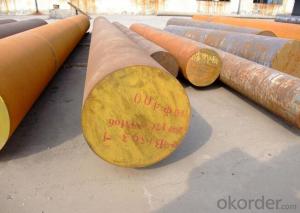Steel SKT4 Alloy Steel Round Bar Special Steel
- Loading Port:
- China main port
- Payment Terms:
- TT OR LC
- Min Order Qty:
- 25 m.t.
- Supply Capability:
- 10000 m.t./month
OKorder Service Pledge
OKorder Financial Service
You Might Also Like
Specification
Chemical Composition%
| Country | Standard | C | Si | Mn | Cr | Ni | Mo | S | P | Other |
| China(GB) | 5CrNiMo | 0.50-0.60 | ≤0.40 | 0.50-0.80 | 0.50-0.80 | 1.40-1.80 | 0.15-0.30 | ≤0.030 | ≤0.030 | - |
| USA(ASTM) | L6 | 0.65-0.75 | 0.20-0.40 | 0.55-0.65 | 0.65-0.85 | 1.25-1.75 | 0.25 | - | - | V:0.25 |
| Germany(DIN) | 1.2713 | 0.50-0.60 | 0.10-0.40 | 0.65-0.95 | 0.60-0.80 | 1.50-1.80 | 0.25-0.35 | - | - | V:0.07-0.12 |
| Japan(JIS) | SKT4 | 0.50-0.60 | ≤0.35 | 0.60-1.00 | 0.70-1.00 | 1.30-2.0 | 0.20-0.50 | ≤0.030 | ≤0.030 | - |
Available Size
| Rolled Round Bar | φ12-80mm |
| Forged Round Bar | Φ85-600mm |
Heat Treatment
| Processing | Temperature ℃ | Hardness |
| Anneal | 760-780 | 197-241HB |
| Quenching | 830-860 | 53-58HRC |
| Tempering | 490-510 | 44-47HRC |
| 520-540 | 38-42HRC | |
| 560-580 | 34-37HRC |
Characterstics
| 1.High toughness and strength | |||||||
| 2.Higher abrasion resistance | |||||||
| 3.Remaining hardness of HB300 at 500℃ | |||||||
| 4.Insensitive to tempering brittleness due to addition of Mo |
Applications: Suitable for large and medium sized forging dies with thickness of 250-350mm for automobiles,tractors,transmission gears,front axle beams and rear axles of automobiles,and forging dies for engineering machine components.
Product Show:

Workshop Show:

1, Your advantages?
professional products inquiry, products knowledge train (for agents), smooth goods delivery, excellent customer solution proposale
2, Test & Certificate?
SGS test is available, customer inspection before shipping is welcome, third party inspection is no problem
3, Payment Terms?
30% TT as deposit and 70% before delivery.
Irrevocable L/C at sight.
4, Trading Terms?
EXW, FOB, CIF, FFR, CNF
6, After-sale Service?
WE provides the services and support you need for every step of our cooperation. We're the business partner you can trust.
For any problem, please kindly contact us at any your convenient time.
We'll reply you in our first priority within 24 hours.
- Q: How does special steel maintain its strength at different temperatures?
- Special steel maintains its strength at different temperatures due to its unique composition and manufacturing process. It is typically alloyed with elements such as chromium, molybdenum, and nickel, which form stable carbides and strengthen the steel's matrix. These alloying elements also enhance the steel's resistance to high temperatures, preventing the softening or deformation that would otherwise occur. Additionally, special steel undergoes heat treatment and precise control of cooling rates, which further optimize its microstructure and ensure its strength is retained even under extreme temperature conditions.
- Q: What are the main advantages of using special steel in the oil and gas industry?
- The main advantages of using special steel in the oil and gas industry include its high strength, corrosion resistance, and ability to withstand extreme temperatures and pressures. Special steel is specifically designed and manufactured to meet the demanding requirements of the industry, ensuring reliable performance and longevity. It also offers excellent weldability, which is crucial for constructing pipelines and equipment used in oil and gas operations. Additionally, special steel's durability and resistance to fatigue make it ideal for withstanding the harsh conditions and environments encountered in the oil and gas sector.
- Q: How is high-strength stainless steel used in the production of structural components?
- High-strength stainless steel is used in the production of structural components due to its exceptional mechanical properties. Its high tensile strength, corrosion resistance, and durability make it an ideal material for constructing load-bearing parts such as beams, columns, and supports. Additionally, the stainless steel's ability to withstand harsh environments ensures the longevity and reliability of these structural components.
- Q: What are the properties of magnetic stainless steel?
- Magnetic stainless steel is a type of stainless steel that exhibits magnetic properties due to its high iron content. It possesses good corrosion resistance, durability, and high strength, making it suitable for various applications. Additionally, it is easily formable and weldable, allowing for versatility in manufacturing processes.
- Q: What are the requirements for special steel used in aircraft manufacturing?
- The critical nature of aircraft components and the demanding operating conditions they face necessitate stringent requirements for the special steel used in their manufacturing. Here are several key requirements that must be met: 1. Exceptional strength: To withstand the extreme forces and loads experienced during flight, special steel used in aircraft manufacturing must possess exceptionally high strength. This is crucial for maintaining the structural integrity and safety of the aircraft. 2. Lightweight: While strength is important, the special steel used in aircraft must also be lightweight. This is to minimize the overall weight of the aircraft, which in turn enhances fuel efficiency and allows for increased payload capacity. 3. Excellent corrosion resistance: Aircraft are often exposed to harsh environments, including high humidity, saltwater, and various chemicals. Therefore, the special steel used in their manufacturing must exhibit excellent resistance to corrosion. This helps to maintain the structural integrity of the aircraft and prolong its lifespan. 4. High fatigue resistance: Special steel must possess high fatigue resistance to withstand the repetitive loading and unloading cycles that occur during flight. This ensures that the components do not fail prematurely due to cyclic stress. 5. Heat resistance: The special steel should be able to withstand the high temperatures generated by the engines and the heat generated during high-speed flight. This prevents deformation, melting, or loss of strength under extreme thermal conditions. 6. Good weldability: The special steel used in aircraft manufacturing should have good weldability, which allows for efficient and reliable joining of components during the manufacturing process. This ensures strong and secure connections between various parts of the aircraft. 7. Non-magnetic properties: In certain applications, such as electronic systems, it is essential for the special steel to be non-magnetic. This is to prevent interference with sensitive equipment. 8. Traceability and certification: To meet industry standards and regulatory requirements, the special steel must have proper traceability and certification. This includes documentation of its composition, manufacturing process, and testing procedures to ensure consistent quality and performance. Meeting these requirements is vital to ensure the safety, reliability, and efficiency of aircraft. Before being used in the construction of aircraft components, the special steel undergoes rigorous testing, quality control, and certification processes to ensure it meets these stringent requirements.
- Q: What are the common challenges in heat treatment of special steel?
- The heat treatment of special steel presents several common challenges that need to be carefully addressed in order to achieve desired material properties. One of the key challenges is the need for precise temperature control during the heating and cooling processes. Special steels often have specific heat treatment temperature ranges that need to be strictly followed to achieve the desired microstructure and mechanical properties. Failure to maintain precise temperature control can result in inadequate or inconsistent heat treatment, leading to suboptimal material performance. Another challenge is the potential for distortion or warping of the steel components during the heat treatment process. Special steels often have complex shapes or intricate designs, making them more susceptible to distortion when exposed to high temperatures. This distortion can negatively impact the dimensional accuracy and overall quality of the final product. Hence, careful consideration must be given to the selection of appropriate heating and cooling methods, as well as the use of fixtures or jigs to minimize distortion. Furthermore, special steels may contain alloying elements that can have a significant influence on the heat treatment process. Alloying elements such as chromium, molybdenum, or vanadium can alter the hardenability, tempering response, or transformation behavior of the steel. These elements may introduce additional challenges when determining the optimal heat treatment parameters, as their presence can necessitate adjustments to the heating and cooling rates, soak times, or quenching media. Lastly, achieving uniformity in heat treatment across a batch of special steel components can be a challenge. Variations in size, shape, or composition within a batch can lead to inconsistent heat treatment results. Controlling the heating and cooling rates, ensuring proper circulation of the heat treatment media, and implementing effective process monitoring techniques are essential for achieving consistent and uniform material properties. In conclusion, the common challenges in heat treatment of special steel include precise temperature control, distortion/warping, the influence of alloying elements, and achieving uniformity across a batch. Addressing these challenges requires a thorough understanding of the steel's composition, careful process planning, and the use of appropriate process controls and monitoring techniques.
- Q: How is high-speed tool steel used in the production of machining tools?
- High-speed tool steel is used in the production of machining tools due to its exceptional hardness, strength, and heat resistance properties. It is commonly used to make cutting tools such as drills, end mills, taps, and inserts, which are vital for precision machining operations. The high-speed tool steel's ability to retain its hardness even at high temperatures allows these tools to withstand the intense heat generated during the machining process, resulting in improved performance and extended tool life.
- Q: What are the quality control measures for special steel?
- The quality control measures for special steel typically involve several steps. First, there is a thorough inspection of the raw materials used to manufacture the steel, ensuring they meet the required specifications and standards. Next, the production process is closely monitored to ensure proper alloying and precise temperature control. Regular testing and sampling are conducted throughout the manufacturing process to check for any defects or deviations from the desired composition and properties. Specialized testing methods, such as ultrasonic or magnetic particle inspection, are utilized to identify any internal or surface defects. Finally, the finished product undergoes a final inspection to ensure it meets all the required specifications, including dimensions, mechanical properties, and surface finish. These rigorous quality control measures help to ensure that special steel meets the highest standards of quality and performance.
- Q: What are the different test methods used to evaluate special steel?
- There are several test methods used to evaluate special steel and ensure its quality and performance. Some of the commonly employed test methods include: 1. Tensile Testing: This method measures the steel's ability to withstand tension or pulling forces. It helps determine the ultimate tensile strength, yield strength, and elongation of the steel. 2. Hardness Testing: Hardness tests, such as Rockwell or Brinell tests, evaluate the resistance of special steel to indentation or scratching. It provides an indication of the steel's strength and durability. 3. Impact Testing: This test measures the steel's ability to absorb energy under high-stress conditions. Charpy and Izod tests are commonly used to determine the toughness and resistance of special steel to sudden shocks or impacts. 4. Chemical Analysis: Chemical analysis involves determining the composition of the steel, including the percentage of various elements like carbon, manganese, chromium, and others. This helps ensure that the steel meets the required specifications and standards. 5. Microstructure Evaluation: Microscopic examination of the steel's microstructure can reveal important information about its grain size, phase distribution, and any potential defects or inclusions. Techniques such as optical microscopy or electron microscopy are employed for this purpose. 6. Corrosion Testing: Special steel often needs to withstand harsh environments or corrosive substances. Various corrosion tests, such as salt spray tests or immersion tests, evaluate the steel's resistance to corrosion and degradation. 7. Non-Destructive Testing (NDT): NDT methods, including ultrasonic testing, magnetic particle testing, or eddy current testing, are employed to detect surface or internal defects without damaging the steel. These tests provide valuable information about the steel's structural integrity. 8. Fatigue Testing: Fatigue tests simulate repetitive loading conditions to determine the steel's resistance to cyclic stress. This helps evaluate the steel's durability and ability to withstand long-term usage or repetitive loading. By employing these different test methods, manufacturers and quality control departments can assess the mechanical properties, chemical composition, microstructure, and other important factors of special steel to ensure it meets the required standards and specifications.
- Q: Can special steel be used in the manufacturing of consumer goods?
- Yes, special steel can be used in the manufacturing of consumer goods. Special steel refers to a specific type of steel that has been engineered to possess unique properties, such as increased strength, corrosion resistance, heat resistance, or wear resistance. These enhanced properties make it suitable for a wide range of applications, including consumer goods. Consumer goods encompass a diverse range of products, such as kitchen appliances, electronics, automobiles, tools, and furniture. Special steel can be utilized in various components and parts of these goods to enhance their performance and durability. For example, in kitchen appliances, special steel can be used to manufacture blades, heating elements, or cooking surfaces, providing improved cutting efficiency, heat distribution, and resistance to corrosion. In electronics, special steel can be used to manufacture casings, connectors, or springs, ensuring durability, conductivity, and resistance to temperature fluctuations. Furthermore, special steel can also be used in manufacturing consumer goods that require high precision and reliability. For instance, in automotive manufacturing, special steel can be used for engine components, chassis, or safety features, providing enhanced strength, impact resistance, and structural integrity. Similarly, in the production of tools and equipment, special steel can be used to manufacture drill bits, cutting tools, or machine components, ensuring longevity, precision, and performance. Overall, special steel offers distinct advantages over conventional steel in terms of its unique properties, making it a suitable material choice for manufacturing consumer goods. Its enhanced strength, corrosion resistance, heat resistance, or wear resistance characteristics can significantly improve the performance, durability, and reliability of consumer products, meeting the demands and expectations of consumers.
Send your message to us
Steel SKT4 Alloy Steel Round Bar Special Steel
- Loading Port:
- China main port
- Payment Terms:
- TT OR LC
- Min Order Qty:
- 25 m.t.
- Supply Capability:
- 10000 m.t./month
OKorder Service Pledge
OKorder Financial Service
Similar products
Hot products
Hot Searches
Related keywords
